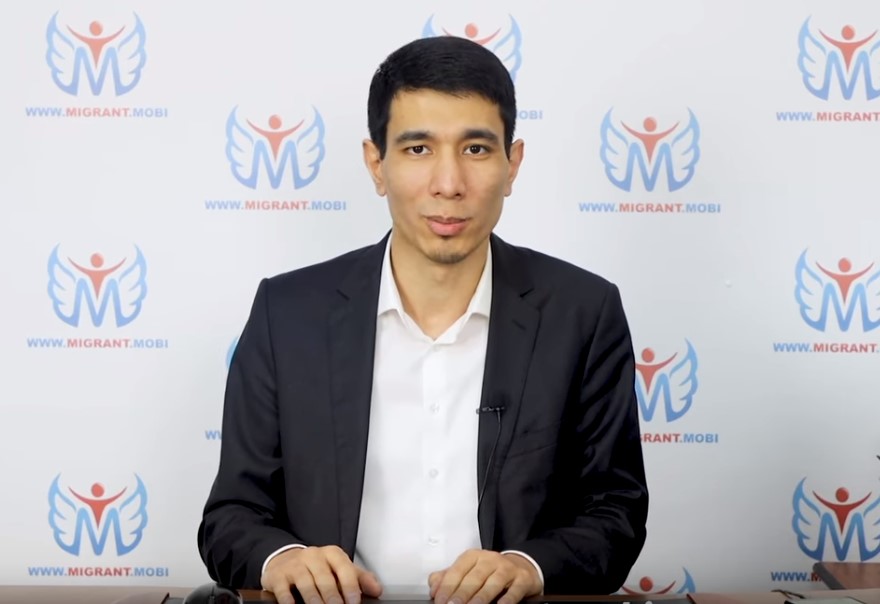Botirjon Shermuhammad, lawyer and founder of the Migrant support centerin Russia, talks about voluntary medial insurance for migrants and explains why they still prefer to travel back to their home countries for treatment.
In Russia, if a migrant feels sick, in most cases he or she just lives with it. When it becomes unbearable, they call an ambulance or contact a commercial clinic. In fact, all healthcare services for migrants in Russia are not free of charge.
National health insurance is available only for foreigners with a temporary residence permit or for Eurasian Economic Union citizens working by contract. In the latter case, national health insurance is valid till the end of the contract.
There are not many people working with a contract; on the other hand, the process of obtaining a temporary residence permit may take years. With the aim of obtaining labor patent, most migrants purchase voluntary health insurance.
When migrants buy voluntary national health insurance, they usually do not consider they might really need it in case of illness. In Central Asia, as well as in Russia, it is not habitual to regularly check-up one’s health or buy an insurance just in case. Yet, recently arrived migrants don’t have extra money. If they have a possibility to avoid paying extra, of course, they do it.
Useless voluntary medical insurance
A standard Voluntary Health Insurance at Sakharovo Multifunctional Migration Center costs 4000 Russian rubles ($55). What does it cover? Let us take a look at the conditions offered by two different insurance companies offering insurance for the same price.
First option: minimal insurance coverage is 200 thousand rubles ($2700) per year and includes:
- Emergency care, which is by detault free of charge for everyone in Russia (hence this is a redundant service).
- Transportation in case of a sudden-onset illness or death.
- Repatriation in case of death.
The second coverage is 130 thousand rubles ($1750), and it includes only “general and specialist emergency care”. Let me remind you, that this type of healthcare is free of charge for everyone.
In addition, the service may be provided only at selected clinics which are contracted by the insurance company. Thus, a migrant should call a hotline, explain their trouble and, if it is covered by the insurance, go to a specific hospital in Moscow.
The big question is: why migrants should pay 4000 rubles ($55) for services which are provided for free to everyone in Russia?
We can see that selling voluntary health insurance is pure business for insurance companies woth little added value for the client. The maximum coverage includes public service in the form of emergency care (an ambulance), and the money goes to the insurer.
In general, medical care in Russia is not cheap. Recently, my children had to be vaccinated. Before the administration of each vaccine, a kid should be examined by a pediatrician, and this costs 1200 rubles ($16). Last week, my child needed a Mantoux test, and then another vaccine 3 days later; so, before the vaccine, my kid had to be examined for the price of 1200 rubles again. In addition, I paid 300 rubles ($4) to the nurse each time, for the injection. Not all parents can afford these costs.
Medical care by arrangement
In general, migrants ask for our help if there is a dispute about treatment. Most often this happens in cases of traffic or workplace accidents. Troubles with a hospital administration may arise, as they ask a migrant to pay for the treatment which is not covered by such voluntary health insurance.
If a migrant worked legally, and the employer was paying Social Security contributions, the Social Security Foundation compensates all costs related to the treatment after an injury. But 90% of the employers do not pay the Social Security Foundation and should compensate the treatment themselves. For far we have been solving these situations directly negotiating with the employers.
If migrants gets seriously ill, in most cases they go to their home country to get treatment; it is always cheaper. Same is true for injuries; migrants receive some financial compensation from the employers and go back to their home countries. I remember a case when a migrant was injured by a steel fixture falling on his head and got disabled due to the accident. In Russia, the estimated costs of rehabilitation amountred to 1 million rubles ($13550); he received 250 thousand ($3390) from the employer and went back to Uzbekistan.
Migrants pay personal income tax, purchase patents; their employers pay to retirement foundations for them. I believe that being legally working people, they have to have something similar to public Social Security Foundation policies.
Author: Ekaterina Ivashchenko
This article was prepared with the support of Oxfam in the Russian Federation
